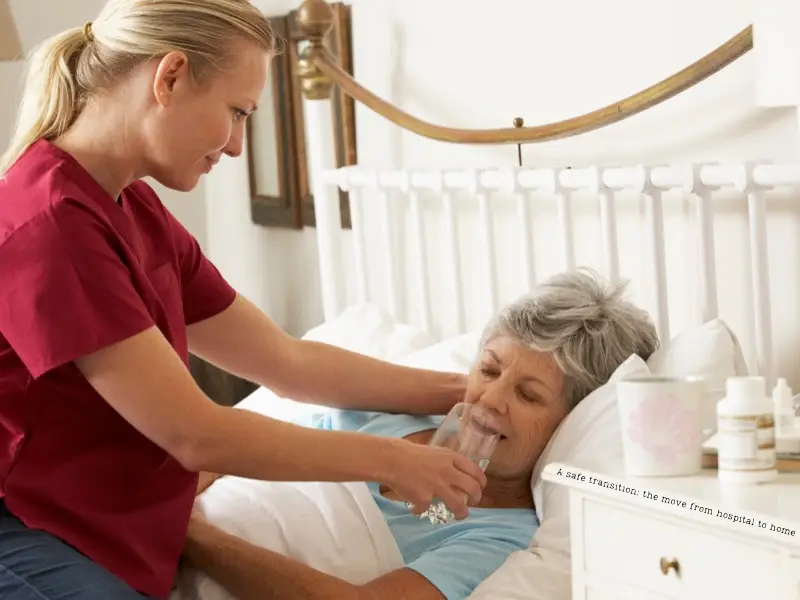
Preparing to leave the hospital is an important part of an older person’s care journey. Going home from the hospital is easier and safer with good preparation, so a step-by-step plan — also called discharge planning — is vital. Here are our tips for ensuring a post-hospital recovery that’s as smooth and healing as possible and avoids hospital readmission.

When to start planning
At some hospitals, discharge planning begins shortly after patients arrive, while at others it starts just a few days before the patient is set to leave. Your hospital will have a discharge planner who will help your loved one with this planning.
Ideally, discharge planning begins early in a hospital stay. Ask to speak with the discharge planner as early on as you can, and get a relationship established with him or her. Having maximum time to organize your loved one’s post-discharge details lets you ask more questions, giving you a deeper understanding of all the details. Together, you can discuss long-term plans carefully and at your own pace.
There will be a lot of information to take in, so ask the discharge planner to put everything in writing, then take your own notes as you go along.
Questions to ask
Whether your loved one is recovering from illness, injury or surgery, start by getting all the needed information and instructions for their care or recovery. Will there be any dressings or bandages to change, or any exercises to do? Will they need to make any lifestyle changes or day-to-day routine changes once they leave the hospital? Are there any foods they should avoid, or any medical equipment or assistive devices (like a walker, a cane or a shower chair) that will need arranging or purchasing?
Make sure you have a good understanding of all your loved one’s prescriptions and any possible side effects, and have someone walk you through how all their medications should be taken. Ask about recurring symptoms or health issues to watch out for, and find out when and where their follow-up appointments or medical tests will be.
Also ask when their other health-care providers, such as their family doctor or specialists, will receive information about the hospital treatment.
Gathering important contacts
It’s important to know when and where to seek medical advice for your loved one post-hospital. Before they leave, ensure you know all the names and numbers to call should you need to. And beyond your loved one’s physical health, think ahead to mental health needs as well. Both for your loved one and for you as their support person, consider getting the contacts of relevant counsellors and support groups.
Details of discharge day
Once you’ve found out the expected discharge date, decide who will be driving your loved one home from the hospital. If a transportation service is being used, remember that you are responsible for any service costs, so make sure a credit card number is provided ahead of time. Before they leave their hospital room, make sure it is checked for any forgotten belongings and double-check with the nurse to make sure nothing is left behind.
Getting your loved one safely settled
Your loved one’s living environment may need home modifications such as ramps and grab bars, and potential tripping hazards may need to be removed.
If your loved one isn’t going back to their own home or a family member’s home, and you are considering a long-term-care facility or retirement community, the discharge planner can likely provide you with a list of recommended facilities.
Arranging any needed services
Helping your loved one continue their recovery once they leave the hospital starts with making sure they have all the in-home supports they need. This may include nurse visits, physiotherapy and occupational therapy, or practical considerations like meal preparation and housekeeping. Getting started early with planning these services is always a good idea and will help keep your to-do list more manageable.
Avoiding hospital re-admission: considering home care
Properly following the health-care team’s instructions is the best way to promote healing and avoid returning to the hospital. But a senior person being readmitted less than a week after their hospital discharge is all too common, often due to dehydration or a fall.
Carefully assessing your loved one’s capabilities before their hospital discharge—and carefully assessing your own abilities, energy, and availability to offer assistance—can help avoid this situation.
Are there personal care needs like eating, drinking, bathing, and toileting that can’t be properly met by your loved one or by you? Will outside help be needed with things like picking up medications and going to appointments? These are all important questions to ask to help determine if home care services are going to be needed.
If there are any tasks that you don’t think you or your loved one can handle, share your concerns with the discharge planner to get their suggestions and even their help with investigating insurance and funding options.
How Just Like Family can help
Our caring Just Like Family team members are experienced, trained professionals who can help ensure that your loved one’s care plan at home is followed. We are here to provide respite for family caregivers with quality home care services including personal care, companionship, home support, overnight care, and live-in care — offering consistent care updates to keep you involved and informed. Our team at Just Like Family is always here for you, ready and qualified to help, however you need us. Please know you can reach out at any time.